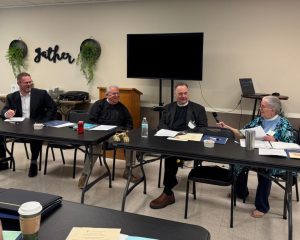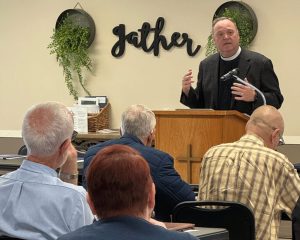Diocesan Stewardship Workshop Provides Tools, Insights for Many
- Written by Nina Keck
- Length 4 minutes, 49 seconds
- Category Articles, Event Coverage, Leadership, Stewardship
On August 30, 70 clergy and lay leaders from 27 churches in the Episcopal Diocese of Central Florida gathered for a stewardship workshop focused on cultivating generosity through gratitude, with Rev. Dr. Jim Taylor emphasizing stewardship as a daily practice rooted in faith rather than obligation. The event offered practical tools and inspiring examples from local parishes to help churches embrace giving as an expression of gratitude for God’s blessings.

On August 30, 70 clergy and lay leaders from 27 churches in the diocese gathered at St. Mary of the Angels, Orlando, for the 2025 stewardship workshop for the Episcopal Diocese of Central Florida, “Transforming Congregational Stewardship: Tools for Giving From Gratitude.” The Rev. Dr. Jim Taylor, member of the diocesan Finance Commission and rector of St. George, The Villages, gave the keynote address for the workshop, which was hosted by the Rev. Phyllis Bartle, diocesan Stewardship Commission chair and rector of St. Jude’s, Orange City.
“We had a mix of people from large and small parishes as well as from clergy and laity,” Bartle said.
The workshop explored how gratitude fuels generosity and how that idea can transform congregational stewardship, illustrated by success stories from local parishes. The day also included a roundtable with diocesan leaders and fellowship during the lunch break.
“We invited participants to send in questions when they registered and then had four different folks available to answer them during the roundtable,” Bartle explained. “Canon Dan Smith, Rev. Jim Taylor, Mr. Roman Franklin and I answered their questions.

“We provided tools,” she said. “By this, I mean Canon Dan spoke of a successful stewardship plan called Celebration Sunday. I spoke to the program called TENS [The Episcopal Network for Stewardship] and Rev. Tom Rutherford gave an overview of the program at Messiah [Church of the Messiah, Winter Garden]. The Rev. Dr. Rob Strenth, who was not on the original agenda, spoke about his successful efforts at capital campaigns.”
Not only was the event well attended, but it was also well received. First-time attendee the Rev. William Brady, deacon at St. Anne’s, Crystal River, was very impressed. “Rob Strenth’s synopsis of the building fund he ran on two occasions was very informative,” he said. “I looked around during Pastor Jim’s talk on stewardship, and he held the audience. He was very knowledgeable. You could tell he had previous experience in this area.”
Taylor primarily discussed gratitude and giving, and he also expressed the seminar’s purpose. “The virtue and unity we are seeking to strengthen in our parishes is how to be a better steward for God with the resources God has given us,” he said. “Our goal in parish stewardship is to make congregational stewardship a daily way of life, not because of budgetary coercion or guilt, but from the foundation of faith, gratitude formation and proclamation.”
He pointed out that American preacher and theologian Jonathan Edwards said in his A Treatise Concerning Religious Affections that two types of gratitude exist: natural gratitude and gracious gratitude.
“Natural gratitude flows freely from us when good things happen,” Taylor said. “We can easily and naturally display emotions or behavior of gratitude when these types of good things occur in our lives.

“In gracious gratitude, we express our love, devotion and commitment to God and his goodness even when difficult circumstances confront us,” he continued. “Gracious gratitude is about not abandoning our faith and belief in God when we receive the notice that our job is terminated or the prognosis from the doctor about our illness is not good. It’s rejoicing in God’s character and love for us. Through our worship, prayers and ministries, we can show our gratitude to God for life itself. We express our gratitude to God explicitly, knowing God’s love will not abandon us. When we believe God has given us everything we possess, then stewardship becomes a daily way of life. We are glad to give and ready to share, because God has shared grace with us. Because of God’s blessings, the pledging of our time, talent and treasure is not believed to be a burden or obligation. Regular practice of Christian stewardship and benevolence is now part of our faith practice. It is who we are as Christians, and we are grateful for the identity that we have in Christ.”
Taylor believes our motivation and attitude towards stewardship go directly to our identity as Christians. “What we do with the resources God has given us in time, talent and treasure speaks volumes about how we have chosen to live out our baptismal covenant,” he explained.
People are accustomed to hearing that stewardship is about time, talent and treasure. However, Taylor said, “We haven’t been given a well-defined meaning of the word. Unfortunately, what we really hear is, ‘treasure, treasure and treasure.’”
Using John Westerhoff’s much more comprehensive definition from his book Grateful and Generous Hearts, Taylor said, “Stewardship as giving up the love of possessing and practicing a life of simplicity; of developing the habit of giving things away; of buying only what is necessary; of rejecting anything to which we are becoming addicted; of learning to enjoy things without owning them; of developing a greater appreciation of and respect for the natural world; of rejecting anything that will result in an injustice for others.
“When we believe God has given us everything we possess, then stewardship becomes a daily way of life,” he continued. “Because of God’s blessings, the pledging of our time, talent and treasure is not believed to be a burden or obligation.”
 Email
Email